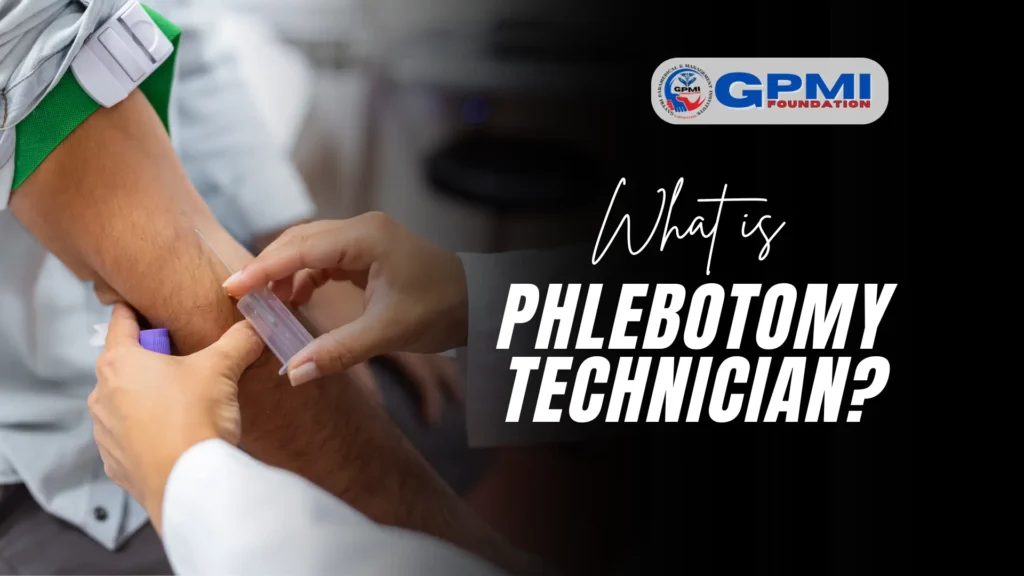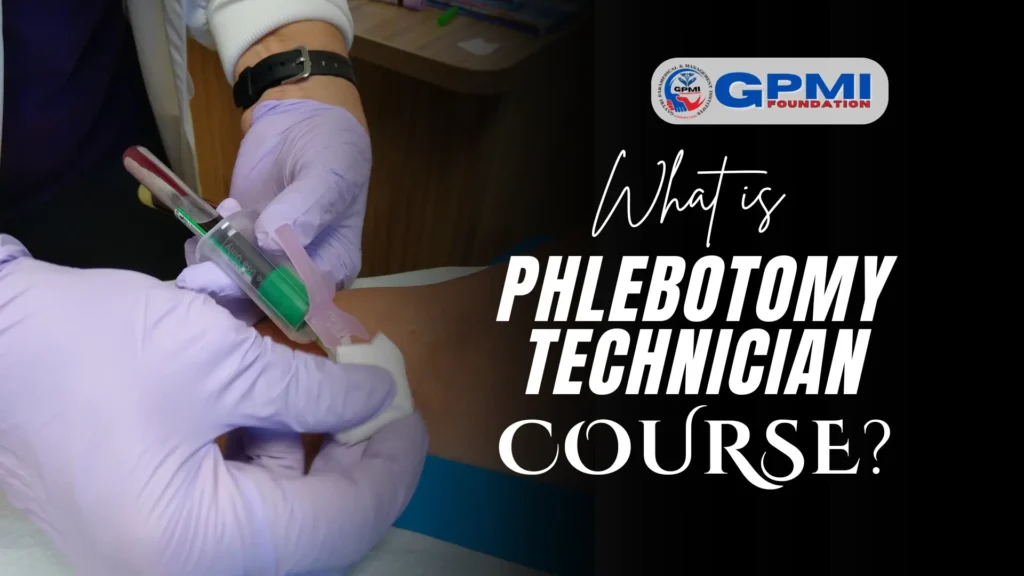Becoming a skilled phlebotomy technician goes beyond drawing blood – it involves mastering essential skills like precision, patience, and effective communication.
Phlebotomists play a vital role in healthcare, collecting blood samples that help diagnose, monitor, and treat medical conditions. They must not only handle blood collection equipment safely but also reassure patients and maintain accurate records.
If you’re aiming for a career in phlebotomy, you need to follow a series of important steps. From obtaining the right education and training to gaining hands-on experience, each step is crucial for building competence and confidence in this field. You’ll also need to consider certification, which can increase your job prospects and earning potential.
In this article, we’ll outline six practical steps that will guide you in becoming an expert phlebotomy Professional, helping you to stand out in a rapidly growing healthcare profession.
Table of Contents
What is Phlebotomy Technician

Phlebotomy Technician Meaning is a healthcare professional trained to collect blood samples from patients. These samples are essential for various medical tests, transfusions, and research.
They work in hospitals, clinics, diagnostic laboratories, and blood donation centers. Their primary responsibility is to ensure that blood is drawn safely and efficiently, following strict medical protocols.
Becoming a certified phlebotomy technician involves completing a recognized training program and passing a certification exam. Certification is not mandatory in all regions, but is highly recommended as it demonstrates a technician’s proficiency and commitment to the profession.
Certified technicians often have better job prospects and may command higher salaries compared to their non-certified counterparts.
Phlebotomy Technician Salary
The salary of a phlebotomist can vary based on factors like experience, location, and the employing organization. On average, a phlebotomist in India earns between ₹2.6 lakh to ₹3.8 lakh per year.
Entry-level positions may offer salaries on the lower end of this range, while experienced technicians, especially those with certifications, can earn towards the higher end. It’s important to note that salaries can differ across regions and institutions.
Phlebotomy Technician Jobs
Phlebotomy professionals can find employment in various healthcare settings, including:
- Hospitals: Both government and private hospitals require phlebotomists to handle routine blood collections.
- Diagnostic Laboratories: Labs specializing in medical tests employ technicians to collect blood samples for analysis.
- Blood Donation Centers: Organizations like the Red Cross hire phlebotomy technicians to manage blood donations.
- Clinics and Outpatient Centers: Smaller healthcare facilities also require phlebotomy services.
With the growing demand for medical testing and diagnostics, the need for skilled phlebotomists is expected to rise, offering ample job opportunities in the healthcare sector.
READ MORE: Top 5 Paramedical Courses After 12th Without NEET: Apply Now
What is Phlebotomy Technician Course

This course is a training program designed to teach students how to draw blood safely and effectively for medical testing, transfusions, and research.
The phlebotomy technician program typically includes hands-on training in blood collection techniques, patient interaction, infection control, and proper handling of specimens.
During the phlebotomy technician training, students learn how to use equipment like syringes, vacutainers, and lancets while maintaining patient safety and comfort.
The course also covers medical terminology and basic lab procedures, preparing graduates to work in hospitals, diagnostic labs, and blood donation centers. Completing this program opens doors to entry-level positions in the healthcare field and is a step toward becoming a certified phlebotomy technician.
Phlebotomy Technician Course Duration
The duration of a Phlebotomist course typically ranges from 3 months to 6 months, depending on the training institute and the program structure.
Some courses may offer accelerated programs for quicker certification, while others include extended practical training to provide hands-on experience. Students learn essential skills in blood collection, patient care, and lab safety, ensuring they are job-ready upon course completion.
Phlebotomy Technician Course Eligibility
To enroll in a Phlebotomy Technician course, candidates usually need to have completed their 10th or 12th standard. Some programs may require a science background, particularly in biology or health sciences.
Additionally, candidates should possess good communication skills, attention to detail, and the ability to work under pressure. Certain advanced programs may also have age and health prerequisites.
Phlebotomy Technician Course Fees
The course fees can vary based on the institute, course duration, and certification type. On average, the course fees range from ₹10,000 to ₹30,000 in India.
Government-funded institutions may offer subsidized fees, while private institutions could charge higher amounts, especially if the program includes extensive practical training and job placement support.
READ MORE: Pathology Course After 12th:- An Ultimate Career & Benefits
Certification for Phlebotomy Technician

Obtaining a phlebotomy technician certification is essential for those who wish to advance in this career. Certification not only validates the technician’s skills but also enhances job prospects and earning potential. Some of the top certifications for a phlebotomist include:
- Certified Phlebotomy Technician (CPT): Offered by the National Healthcare Association (NHA), this certification is widely recognized and covers blood collection procedures, patient interaction, and specimen handling.
- Phlebotomy Technician Certification (PTC): Provided by the American Society for Clinical Pathology (ASCP), this certification is a benchmark for excellence in phlebotomy and is highly regarded in the healthcare industry.
- National Certified Phlebotomy Technician (NCPT): Administered by the National Center for Competency Testing (NCCT), this certification assesses the technician’s competency in blood collection, infection control, and patient care.
- Registered Phlebotomy Technician (RPT): Offered by the American Medical Technologists (AMT), this certification focuses on practical skills and theoretical knowledge in phlebotomy.
- Certified Phlebotomy Instructor (CPI): This advanced certification is ideal for experienced technicians who wish to teach and train aspiring phlebotomists in educational institutions or training centers.
Obtaining one or more of these certifications can significantly enhance a phlebotomy technician’s career prospects and open doors to advanced roles in diagnostic labs, hospitals, and blood donation centers.
READ MORE: Become An Expert X-Ray Technician in 7 Easy Steps
How to Become a Phlebotomy Technician?

Phlebotomy is a crucial part of the healthcare system, involving the collection of blood samples for testing, transfusions, research, or donations. If you’re considering a career in phlebotomy, you’re looking at a profession that offers job stability, hands-on work, and opportunities to help patients directly.
Here’s an easy-to-follow 6-step guide to becoming an expert phlebotomist:
1. Understand the Role:
Before you dive into training, it’s essential to understand what a phlebotomy technician does. They are responsible for drawing blood, labeling samples accurately, and ensuring patient safety during the blood collection process.
Phlebotomists work in various settings, including hospitals, diagnostic labs, clinics, and blood donation centers. They also maintain equipment, handle patient records, and follow strict safety protocols to prevent infections. Understanding these responsibilities will help you decide if this role is a good fit for you.
2. Complete High School or Obtain:
A high school passed is the minimum educational requirement to enter a phlebotomy training program. Focus on subjects like biology, anatomy, and health sciences to build a strong foundation for the course work ahead.
Developing good communication skills is also essential, as phlebotomists need to explain procedures to patients and ease their anxiety.
3. Enroll in a Phlebotomy Training Program:
Phlebotomy training programs can be found at community colleges, vocational schools, and healthcare institutions. These programs typically last 3 to 12 months, depending on the level of training.
The curriculum includes topics like blood collection techniques, infection control, lab safety, patient interaction, and medical terminology.
Many programs also include hands-on practice through clinical internships, where students get to draw blood under supervision. Completing a comprehensive training program is crucial for building confidence and competence in the field.
4. Gain Practical Experience:
Hands-on training is one of the most important steps in becoming a phlebotomist. During clinical practice, you’ll learn how to perform venipunctures, finger sticks, and heel pricks, and how to handle patients of all ages.
You’ll also practice labeling and handling blood samples to prevent contamination. Practical experience not only improves your skills but also helps you build connections with potential employers. Many training programs assist with job placement, so make the most of these opportunities.
5. Obtain Certification:
While certification is not always required, it is highly recommended for better job prospects and higher pay. Organizations like the National Phlebotomy Association (NPA), American Society for Clinical Pathology (ASCP), and the National Healthcareer Association (NHA) offer phlebotomy certification exams.
To qualify, you must complete an accredited training program and pass a written and practical exam. Certification demonstrates your competence in blood collection procedures, patient care, and lab safety, making you a more attractive candidate to employers.
6. Apply for Jobs and Continue Learning:
After getting certified, start applying for entry-level positions in hospitals, labs, and blood banks. Create a strong resume highlighting your training, clinical experience, and certification.
As you gain experience, consider advancing your career by pursuing additional certifications in areas like EKG, medical assisting, or donor phlebotomy. Continuous learning can open doors to supervisory roles or specialized positions in healthcare facilities.
Additionally, stay updated on new blood collection techniques and safety protocols to maintain your expertise and credibility.
By following these 6 steps, you can build a successful career as a phlebotomist. It’s a role that offers stability, hands-on work, and opportunities to make a difference in patient care. Stay committed, keep learning, and take pride in the vital work you do as a phlebotomy technician.
READ MORE: How to Become an OT Technician in 6 Easy Steps?
Conclusion
Becoming an expert phlebotomy technician involves more than just learning how to draw blood – it requires a commitment to precision, patient care, and continuous learning. By following the 6 steps, you can establish a strong foundation for a successful career.
Phlebotomists play a critical role in healthcare by ensuring accurate blood collection and handling, which aids in accurate diagnosis and treatment. As you progress in this field, consider pursuing specialized certifications or advanced training to increase your earning potential and open doors to supervisory or specialized roles.
The demand for skilled phlebotomy Professionals is on the rise, making it a stable and fulfilling career choice for those who are detail-oriented, compassionate, and committed to providing quality patient care.
Frequently Asked Questions
If you’re considering a career in phlebotomy or are simply curious about this profession, we’ve compiled some frequently asked questions to provide you with essential insights and guidance.
What is the difference between a phlebotomist and a phlebotomy technician?
A phlebotomist and a phlebotomy technician generally perform the same primary task – drawing blood from patients for testing, transfusions, or donations. In practice, the terms are often used interchangeably, but some employers may expect phlebotomy technicians to have a wider skill set and potentially more training or certification.
What does a phlebotomy technician do?
A phlebotomy technician is a healthcare worker who specializes in drawing blood from patients for medical tests, transfusions, research, or blood donations. They label and prepare blood samples for laboratory analysis, maintain equipment, and follow safety protocols to prevent contamination or infection. They also reassure patients, explain procedures, and ensure proper patient identification to avoid errors.
What is a cardio phlebotomy technician?
A Cardio Phlebotomy Technician is a healthcare professional trained in both phlebotomy and basic cardiovascular procedures. Along with drawing blood, they are skilled in performing basic cardiac tests such as electrocardiograms (ECGs or EKGs), monitoring heart rhythms, and assisting in cardiovascular diagnostic procedures. This dual expertise makes them valuable in hospitals, cardiac clinics, diagnostic labs, and outpatient centers.
What is the highest pay for a phlebotomist?
The highest salary for a phlebotomist in India varies based on factors like experience, location, and employer. According to Talent.com, experienced phlebotomists can earn up to ₹1,608,000 per year. Additionally, Salary.com reports that certified phlebotomists have an average annual salary of ₹556,000
What is the average salary of a phlebotomy technician?
As of 2025, the average annual salary for a phlebotomy technician in India is approximately ₹3.3 to ₹3.8 lakh, with variations based on experience, location, and employer type . Salaries tend to be higher in Tier 1 cities like Mumbai and Bengaluru and in private healthcare settings.
How long does it take to become a phlebotomy technician?
It typically takes 3 to 12 months, depending on the training program and certification requirements. Certificate/Diploma Program: 3 to 6 months. Associate Degree Program: 1 to 2 years. On-the-Job Training: 1 to 3 months.







